 |
 The Virtual Corkscrew Museum's Weekly Newspaper |
 |
 |
 The Virtual Corkscrew Museum's Weekly Newspaper |
 |
|
Sunday, November 29, 2009 |
Number 586 |
Freyseng Cork Company

A 1902 Canadian Directory lists the Freyseng Cork Company, Ltd. with addresses in Montreal (655-661 St. Paul Street) and Toronto (Queen and Sumach). The listing shows the company as a manufacturer of bungs, spiles, cork pullers, cork, and lemon squeezers. The company advertising appears on two plates on the horse legs corkscrew shown below. The corkscrews were produced by Steinfeld and Reimer in Germany.
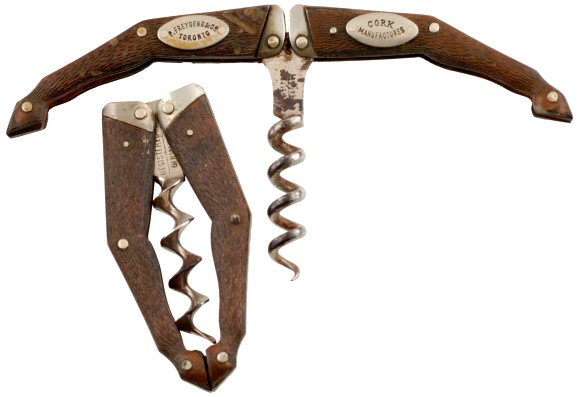
Peter Freyseng emigrated from Germany (Mannheim), his place of birth (1842), to New York in 1860. There he took a job with the firm of Gooderwill and Bucknell, wholesale importers of cork wood. Peter moved to Ontario around 1871 and by 1881, he and his brother John were manufacturing cork in Toronto. By 1903 officers of the firm were Peter Freyseng, President; Edward J. Freyseng, Vice President, and John P. Freyseng, Manager. Peter died in 1912. Edward was Peter's son (born 1872 in Ontario). Edward served in various positions and by 1920, he became President of the firm.
Industries of Canada published in 1886 lists the J. E. Doyle Co., 431 St. James St. West as a manufacturer and importer of corks, capsules, corking machines, tinfoil, bottling wax, and wire. They report that the firm employed a large force of workmen engaged in "manufacturing corks of all sizes for all purposes ... for bottlers, druggists, etc. ... Corks of any size are cut to order with promptness and all business is conducted upon a sound, liberal, honourable basis." The publication further notes that J. E. Doyle and Peter Freyseng also have an office in Toronto where a substantial amount of business is transacted. It is quite likely that the Doyle operations in Montreal became P. Freyseng & Co. subsequent to 1886.
An interesting side of the firm is revealed in the 1904 Canadian Labor Gazette:
CONVICTIONS AT TORONTO UNDER ALIEN LABOUR ACT
On Tuesday, January 26, Isaac McClain and David H. Beecher laid an information before the clerk of the police court at Toronto, upon which a summons was sworn out against Edward Freyseng, of the Freyseng Cork Company, (Limited), of the city of Toronto, charging that in the month of July, 1903, Mr. Freyseng had violated the provisions of the Alien Labour Act, by having induced two citizens of the United States to come to Canada to work in his establishment by an agreement made previous to their coming and by prepaying their transportation.
There were several adjournments of the hearing, and, on February 29, when the case was finally tried, the defendant was convicted by the presiding magistrate and fined $50 and costs, or thirty days, for each of the two violations of the Act. In his defence, Mr. Freyseng maintained that there had been a strike in his factory a short time previous to the time of employing the Americans, as complained of, and that during the strike a rival firm had employed some of his men, and he had been left short-handed; the men had not been brought in to break the strike, but only because he was unable to get cork-cutters in this country. He maintained, further, that he acted in the matter without any knowledge that he was breaking the law. The magistrate remarked that he had no doubt that the defendant had not intended to break the law, but that ignorance of the law was no defence. The fines were paid into court by Mr. Freyseng and forwarded by the clerk to the Receiver General at Ottawa in accordance with the provisions of the law.
In the ensuing years, Edward's list of accomplishments showed what an upstanding citizens he was. He was one of the founders of Canadian Foresters' Hall, Ltd.; one of the founders of Dufferin School Old Boys' Association; honorary VP of the Canadian Manufacturers' Association; Director of the Rosedale Association; Director of the Canadian National Exhibition; member of the Board of Trade Bureau of Municipal Research. He also was active in the Toronto Guild of Civic Art; the Toronto Playgrounds' Association; the Red Cross (Life); and the Ontario Motor League. Edward died in Toronto in 1944.
The envelope below has a 1932 postmark showing the Toronto address as 69-71 Sumach Street and the Montreal address as 821 St. Paul St. W. The second envelope has a 1947 postmark.
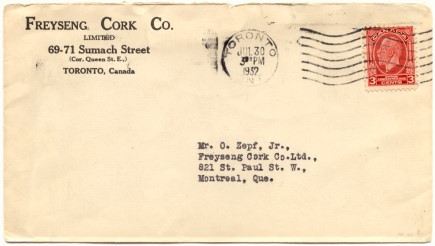
Submitted by Jean Grignon
Submitted by Jean Grignon
What is in the Box? (2)
In the November 15, 2009 issue, we asked "What is in the Box" and presented a miner's bar tool set in a metal box labelled "Karlsberg." Now here is a cardboard box with a jack hammer which can be hung from the mining card hook included in the set. It reveals the tools come from Holtzmann Saarbrücken.
The Holtzmann Creativ Werbemittel GmbH & Co. KG was founded in 1949 by Dirk and Jens Holtzman with about 25 employees and based in the capital of Saarland in Saarbrücken, Germany. Priorities of the trading company are consulting and implementation of creative advertising concepts based on extensive market and trend knowledge. They develop and customize promotional items. Holtzmann's current range of products includes knives with corkscrews and waiters' friends.
Dämmer's Patent
On July 6, 1984 Dämmer Formscheissfabrik in Solingen, Germany applied for a patent (on behalf of Walter Dämmer, the inventor) for a bottle shape corkscrew with the worm folding into the backside and a capsule cutter knife concealed by the bottle top. German patent 3424890 was issued January 16, 1986
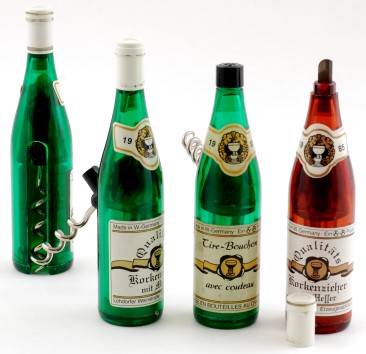
The finished product
The bottles on the right and left above are 5 1/8" tall. They were produced in green and amber plastic. They are marked D.B.G.M. West Germany on the bottom. The neck label has a 1985 date. On the main label is "Made in W. Germany, Ein (logo) Produkt, Qualitäts Korkenzieher Mit Messer, Löhdorfer Weinstrasse, Erzeugerabfüllung." The bottle second from right has the same bottom and neck label markings but in this French version, the label is "Tire-Bouchon, avec couteau, Mise en Bouteilles au Chateau."
The company Walter Dämmer GmbH was founded in 1959 in the welded products business. Taking advantage of the emerging plastics revolution, they shifted emphasis and in 1969, domestic production began with the purchase of the first injection molding machine. The firm developed a variety of promotional materials. Today, the company is not only active in the promotional advertising field, but also as a manufacturer of technical plastic parts.
Knuckle Duster Corkscrew
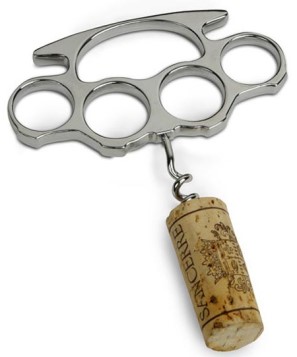
In several past issues we have published stories about corkscrews being used as weapons. In the past month three corkscrew stabbings in the United States made headline news. Now, just in time for Christmas, we find this corkscrew "weapon" offered with this advertising copy:
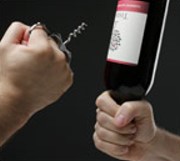
"The Knuckle Duster Corkscrew is a tribute to the idea that great things sometimes can only be accomplished with a struggle. Like the grapes must fight with the elements to grow into wine and the alcohol must then fight with your brain cells to grow into happiness.
The Knuckle Duster Corkscrew looks great in your bar or office – no one should be brave enough to argue with you when they see it. And if they do become violent, just crack open a bottle of wine, and you will be instant friends. Knuckle Duster Corkscrew – peace through libation."
Credo Revisited
Another Corkscrew from Credo
See last week's issue for more on Credo.
Corkscrews for Sale
Ebay auction of 116 Corkscrew, Openers, and Knives ending Sunday, November 29. Click here for list.
Over 700 corkscrews for sale at fixed prices. Click here to access site.
|
©2009 Don Bull, Editor |